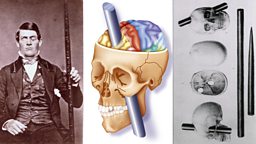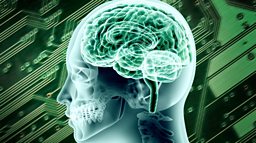- UID
- 20
- Online time
- Hours
- Posts
- Reg time
- 24-8-2017
- Last login
- 1-1-1970
|
The brain is an intricate organ. Responsible for our identity, it controls our breathing, identifies pleasure and pain and cradles our imagination. Yet we still know very little about it. NATALIE BUSHE joined the experts at the recent Hay Festival to take a fantastic journey around the brain.
1. Damaging your brain might not kill you, but can change your behaviour

Phineas Gage with the tamping rod and various views of the wound to his skull | Art Collection/BSIP SA/Everett Collection Historical/Alamy
In 1848 American railroad foreman Phineas Gage experienced a freak accident when a tamping rod was blown straight through his head while he was packing down explosives.
He survived the accident with relatively little lasting physical damage apart from blindness in one eye, but his friends noticed that after the accident the once polite, gentlemanly and thoughtful Gage had become rude, obnoxious and irresponsible.
In the accident Gage had damaged the prefrontal area of the brain - this helped scientists to understand that damage to this specific area could result in behavioural changes.
2. There are three types of memory

Benedict Cumberbatch as Sherlock Holmes
Writer and science consultant Helen Thomson, author ofUnthinkable: An Extraordinary Journey Through the World's Strangest Brains, explains that there are three kinds, or stages, of memory:
*.Sensory memory: the first to enter your brain. Stimulated by sight, hearing, taste, smell and touch, it lasts only a split second and helps the brain formulate a sense of your environment.
*.Short-term memory: it captures what you are currently thinking about, and is said to have a finite capacity of seven items which can be held in the mind for 15-30 seconds.
*.Long-term memory: offers the facility of mental 'time travel' to the past, and by processing experiences it predicts the future by making sense of the world around you.
Mind palaces
A case study from Thomson's book examines Jill Price, who can remember every single day of her life. Her recall is a result of a condition called hyperthymesia. But there are ways for us all to improve our recall, like creating a memory palace.
Some will recognise the term from the BBC drama Sherlock, but the idea is an old one. Imagine a house in your mind, then make a journey through it and place the items you want to remember within the space. The visual prompt makes the memory much more accessible.
3. The brain has an amazing capacity to repair - and rewire - itself

Image: The Lightwriter/Alamy
Although it was once thought that the brain was 'fixed' from birth, with a set number of cells and neuronal circuits, it has been discovered that it is able to compensate after injury or impairment and rewire itself.
This 'neuroplasticity' allows for the learning of new skills and redistribution of new brain cells. The evidence for neuroplasticity can be found in patients recovering from strokes and even in the creation of new neural pathways in rehabilitated drug addicts. If the neural damage occurs before the age of five, the capacity for cerebral reorganisation is greater.
4. Teenagers can't help the way they act
The demonising of teenagersfor their behaviour has been happening since the time of Socrates. But Professor Sarah-Jayne Blakemore, author ofInventing Ourselves: The Secret Life of the Teenage Brain, argues that the adolescent brain should be nurtured and celebrated for its vulnerability and extreme creativity as it undergoes extensive development.
Adolescent sensation-seeking behaviour in humans increases between the age of 10 and the late teens, peaking at 19 and falling off in the twenties, and it's thought there may be an evolutionary purpose to showing off: a need to become indepdendent and establish yourself in the social hierarchy.
And it's certainly not unique to humans - similar behaviour has been observed in species including rats, mice and monkeys.
Peer pressure
Prof Blakemore explains that friends are more important to us during adolescence than at any other stage of our life. But the resulting peer pressure has profound implications.
When driving in the presence of friends, adolescents took almost three times as many risks as when alone. It’s not fully understood why, but its possible that adolescents find passengers more distracting than adults do - or simply that risk-taking behaviour may be seen as 'cool'.
5. 'Mirror neurons' help us feel empathy

Image: Zivica Kerkez/Alamy
Have you ever wondered why you wince watching a fierce football tackle on TV, or feel inclined to cry when someone else is? This empathy originates in 'mirror neurons', discovered by Giacomo Rizzolatti in 1991.
Primarily found in the motor-planning area in the brain of macaques, later studies found them in humans. The neurons are not solely confined to movement areas of the brain but can be found in areas concerned with emotion, sensations and intent. They are triggered when you move and when you see someone move, resulting in an unconscious mimicking of the action.
You can test the theory by sticking your tongue out at a baby and watch the response. In mirroring the movement we share in others' experience and consequently their feelings. Mirror neurons help us to interpret, understand and empathise with the actions of others.
Unthinkable: An Extraordinary Journey Through the World’s Strangest Brainsby Helen Thomson is published by John Murray;Inventing Ourselves: The Secret Life of the Teenage Brainby Sarah-Jayne Blakemore is published by Doubleday;Brainstorm: Detective Stories from the World of Neurologyby Suzanne O’Sullivan is published by Chatto & Windus; andThe Brain Bookby Rita Carter is published by Dorling Kindersley.
► Source |
|